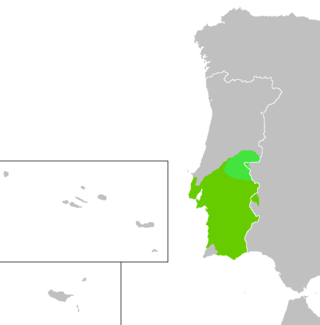Alentejan Portuguese
| Alentejan Portuguese | |
|---|---|
| Native to | Portugal, Spain |
| Language codes | |
| ISO 639-3 | – |
 Distribution of Alentejan and Alto-Alentejan dialects
Alto-Alentejan Portuguese
Alentejan Portuguese | |
Alentejan Portuguese is a dialect of Portuguese spoken in the Portuguese region of Alentejo. It is also spoken, with its own subdialect, in the Spanish municipalities of Olivenza and Táliga which for several centuries (1297 to 1801) were part of Portugal; in this area the language is currently endangered.
Characteristics
- Presence of the article before the possessive pronoun, as in Ladino
- The regular use of the gerund in the present tense, as in Brazilian Portuguese
- A shift of ou to oi: oitro for outro
- Paragoge with i added to the end of verbs in the infinitive of verbs: fazeri for fazer
- The diphthong ei is replaced by e: galinhero for galinheiro, Spanish: gallinero
![[icon]](//upload.wikimedia.org/wikipedia/commons/thumb/1/1c/Wiki_letter_w_cropped.svg/20px-Wiki_letter_w_cropped.svg.png) This section needs expansion. You can help by adding to it. (December 2009)
This section needs expansion. You can help by adding to it. (December 2009)
Present situation in Olivenza and Táliga
The 2005 report of the Council of Europe's expert group on the implementation in Spain of the European Charter for Regional or Minority Languages, 2005[1] asked the Spanish government to furnish information about the situation of Oliventian Portuguese, and for measures for the protection and promotion of that language under the provisions of Article 7 of the Charter.[2] However, in the report submitted by Spain in 2006, there are no references to Oliventian Portuguese.[3]
In the 2008 report the following paragraphs were listed:[4]
48. The Expert Committee has received no information on the use of Portuguese in Extremadura, particularly in Olivenza.
49. According to information gathered during the site visit, the Portuguese language (the Oliventina) is traditionally spoken in Olivenza and Táliga since the 13th century. However, the information received on the current use of this language is inconclusive, but indicates that Portuguese is taught as a foreign language in the education field.
50. The Expert Committee can not assess the situation of Portuguese in Extremadura, and urges the authorities to clarify this issue in the next cycle of monitoring, particularly in cooperation with the association "Além Guadiana", recently established to promote the Portuguese language.
References
- ^ Carta Europea de las Lenguas Minoritarias o Regionales
- ^ Aplicación de la Carta en España. Ciclo inicial de control, 21 de septiembre de 2005, pg. 13.
- ^ Segundo informe sobre la aplicación en España de la Carta Europea de las Lenguas Minoritarias o Regionales (2006) (PDF) (in Spanish)
- ^ Carta Europea de las Lenguas Regionales o Minoritarias. Aplicación de la Carta en España (PDF) (in Spanish), Estrasburgo: Council of Europe, 11 December 2008, p. 9
